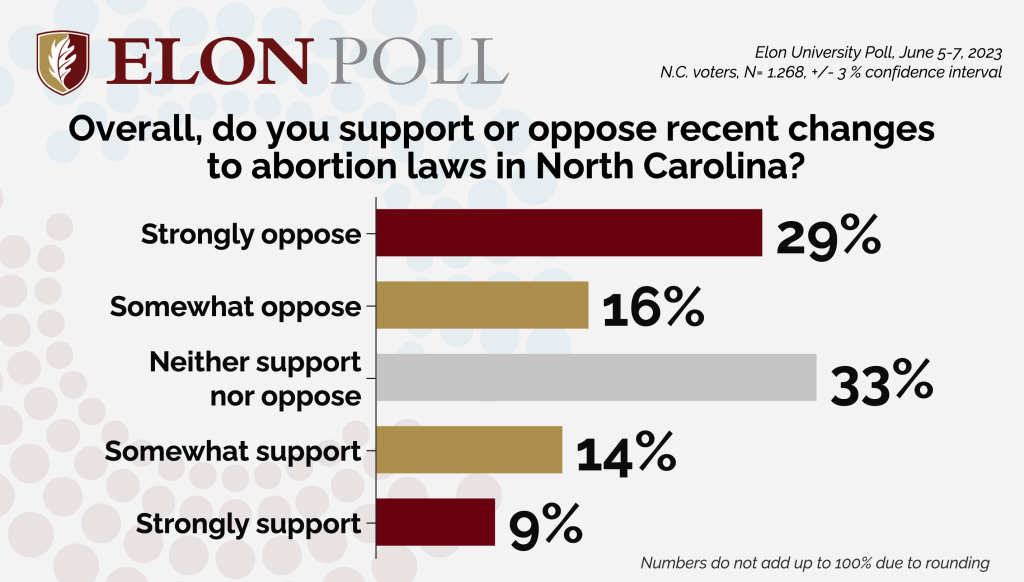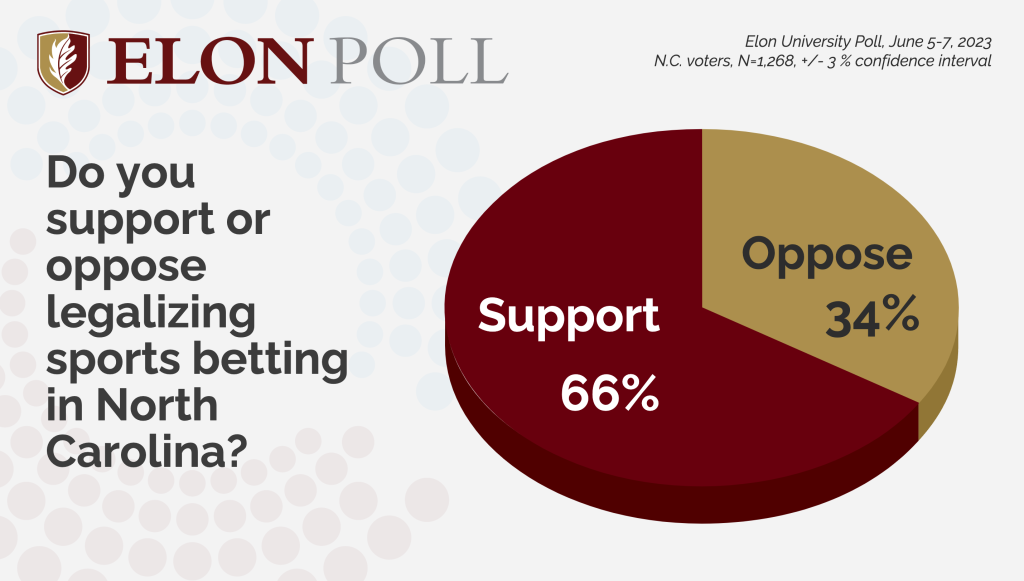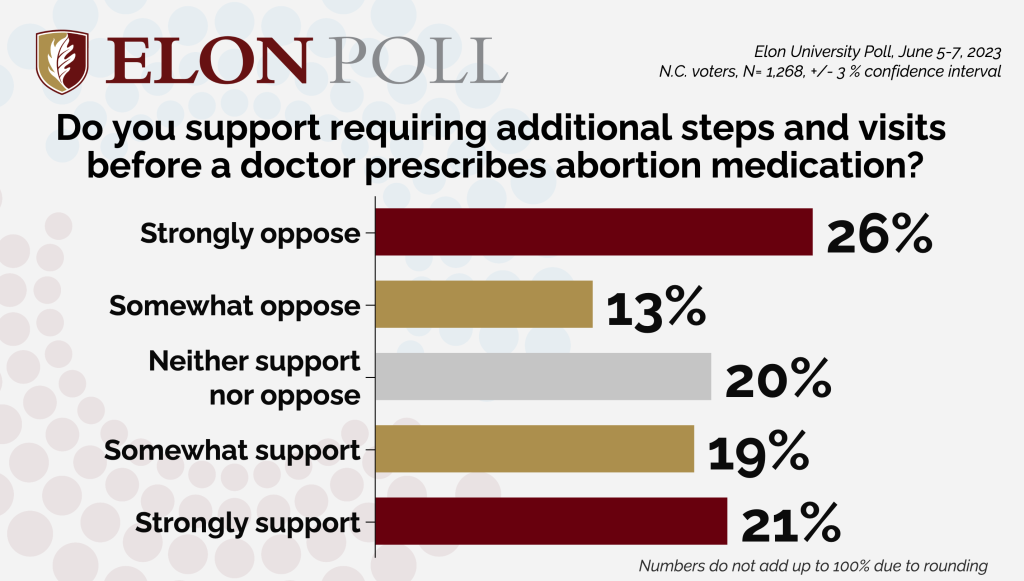Elon Poll: Broad support for sports betting but divisions over abortion law changes
Published June 14, 2023
By Elon Poll
The Elon University Poll conducted a survey of nearly 1,300 N.C. voters asking for their thoughts on the legalization of sports betting, changes to abortion laws in North Carolina and how they rate candidates for N.C. governor and for president.
A bill awaiting the signature of Gov. Roy Cooper that would make gambling on sports legal in North Carolina has the support of two-thirds of the state’s voters, according to the most recent survey by the Elon University Poll.
The survey found that an overwhelming majority of North Carolinians believe legalizing sports betting will generate useful tax revenues and reduce illegal bookmaking. Similar majorities disagree with the idea that legalizing sports betting would create a financial burden on poor people or that the legalization is an endorsement of something that is morally wrong, the poll has found.
The state is more divided over another high-profile issue — the recent action by the General Assembly to change abortion restrictions and make it illegal in most cases to obtain an abortion after the 12th week of pregnancy, a reduction from the previous 20-week threshold. About 45 percent of N.C. voters say they strongly or somewhat oppose the recent law, which was passed over the governor’s veto, while about 23 percent say they oppose it. The remaining 33 percent say they neither support nor oppose the changes.

The poll found that 54 percent of N.C. voters trust Gov. Roy Cooper more than the General Assembly when it comes to abortion policy while 46 percent trust the legislature more with making those decisions.
“As the 2024 election cycle takes off and the General Assembly engages major controversial issues, North Carolina politics is in full swing,” said Jason Husser, associate professor of political science and director of the Elon University Poll. “We conducted this poll because we want to know what voters are thinking about the policy decisions and major elections that impact their lives.”
The poll also asked how favorably voters consider a range of candidates for N.C. governor and for U.S. president. Among Republican candidates for governor, Lt. Gov. Mark Robinson rates the highest in familiarity and favorability with Republican voters in North Carolina while among Republican candidates for president, former President Donald Trump was viewed the most favorably by Republicans in the state followed by Florida Gov. Ron DeSantis and former Vice President Mike Pence.
“The 2024 North Carolina gubernatorial campaign cycle has yet to reach many voters and has a substantial opportunity to change,” Husser said. “We presented the names of all three Republicans as well as Democrat Josh Stein, and over one-third of voters said they were not familiar with the specific candidates.”
The survey of 1,268 North Carolina voters was conducted June 5-7, 2023 using an opt-in online sample provided by Lucid, LLC. More information about the Lucid marketplace and quality tests are available here. The survey has a credibility interval of +/- 3 percent. The credibility interval is an accuracy measure for opt-in online surveys. A fuller explanation of the credibility interval and the survey methodology are available in the full report.
This survey was conducted in partnership with the Charlotte Observer, the Raleigh News & Observer and the Durham Herald-Sun.
Support for sports betting in N.C.
Once Gov. Roy Cooper puts his signature House Bill 347, North Carolina will become the newest state in the union to allow sports betting using online devices. The measure, which Coopers has said he will sign, would allow adults with wagering accounts to place bets online through computers or mobile phones, with betting potentially beginning as soon as January.
Opponents of the legislation pointed to the potential impact upon those already struggling financially, but that argument didn’t carry much weight with N.C. voters, the poll found. Sixty-one percent said they disagree with the idea that legalization will create a financial burden on poor people while 39 percent believe that it will. Similarly, 67 percent of voters disagree with the idea that legalizing sports betting would be an endorsement of something morally wrong while 33 percent agree.

Voters generally agree with the arguments made by those who supported the legislation. Seventy-seven percent of voters said they believe legalizing sports betting will generate useful tax revenues while 30 percent said it would not and similarly, 70 percent said legalization would reduce illegal bookmaking while 30 percent said it would not.
“North Carolina is known for highly competitive elections and close divides on issues, but when it comes to legalizing sports betting, those in support outnumber those opposed by about two to one,” Husser said. “When we asked voters in favor why they support legalization they often mentioned personal freedom, that it is happening already legal or not, and that neighboring states were doing it. Voters opposed often mentioned morality and financial consequences of gambling.”
The Elon Poll found variation in support for the legalization of sports betting along gender, age and other demographic lines. Men were much more supportive of legalization, with 76 percent saying they were in favor compared to 58 percent of women. Black voters were more supportive of legalization than white voters, and Democrats were more likely to support legalization than Republicans. Additionally, those under the age of 45 were more likely to support making sports betting legal than those over 45 and older.
State divided on abortion restrictions
The Elon Poll found that there is a substantial portion of the state’s population — 45 percent — that is opposed to Senate Bill 20, which was passed this year and reduces the amount of time before a pregnant woman can legally obtain an abortion. It’s an issue many are following, with two-thirds of voters saying they are following the news about abortion law changes fairly or very closely.
Interestingly, the Elon Poll found that the number of those who are on the fence about the recent changes to abortion laws shifts when more details are offered about what those changes entail. The poll asked “Overall, do you support or oppose recent changes to abortion laws in North Carolina,” with 45 percent saying they somewhat or strongly oppose the changes, and 23 percent saying they somewhat or strongly support the changes. Those who neither support nor oppose the measure account for 33 percent of voters.
However, when the question offers specific details of the law — “With some exceptions, North Carolina reduced the maximum weeks of pregnancy in which abortions are allowed from 20 weeks to 12 weeks. Do you support or oppose this change?” — those numbers shift. Those who oppose the law make up 45 percent of the voters, but a substantial segment of those who were on the fence shifted. To this question, 36 percent responded that they support the change while 20 percent say they neither support nor oppose the change.
The poll found that women and Democrats were more likely to oppose the change from 20 weeks to 12 than men and Republicans, and those at either end of the age spectrum – either 18 to 24 or over the age of 65 – were more likely to oppose the new law. Those who said they attend church at least once a year or less were more likely to oppose the change than those who attend once a week or more.
“With changes to restriction of weeks, specific exceptions, and new rules for physicians, Senate Bill 20 is a multifaceted and complicated piece of legislation for a pollster to measure,” Husser said. “As a result, we asked about support of changes overall as well as two specific components: additional steps for medical abortion and moving maximum weeks from 20 to 12. On all three measures, voters in North Carolina are divided, with opposition highest to the maximum week reduction. As one would expect, Republican voters and those who attend church regularly were characteristics associated with higher support.”
The Elon Poll found voters nearly evenly split on measures that require additional steps and visits to the doctor before a medical abortion is possible that were also included in the new law. Among N.C. Voters, 39 percent said they opposed the measures, 40 percent said they supported them and 20 percent said they neither supported nor opposed them.

The survey also explored the understanding that N.C. voters have about how abortions are performed, when they are performed and how risky they are compared to childbirth. Since abortion pills gained FDA approval in 2000, the percentage of medication abortions has consistently risen and first outnumbered surgical abortions in 2020. Asked which type of abortion was most common, 57 percent of N.C. voters incorrectly said that surgical abortions were more prevalent while 43 percent said medication abortions.
While the majority of N.C. voters responded incorrectly, the proportion that responded correctly has grown since the Elon Poll last asked this question in October 2021. At that time, 69 percent said that most abortions were surgical abortions and 32 percent said that most were medication abortions.
Asked about during which trimester most abortions are performed, 66 percent of N.C. voters correctly said the first trimester. Thirty-one percent said during the second trimester and 4 percent said during the third. According to the CDC, 93 percent of abortions were performed in the first trimester in 2020.
Research published in 2012 found that women were 14 times more likely to die during or after childbirth than to die from complications of an abortion. Asked which they thought was associated with a higher risk of medical complications, abortion or childbirth, 56 percent of N.C. voters said childbirth while 44 percent said abortion.







